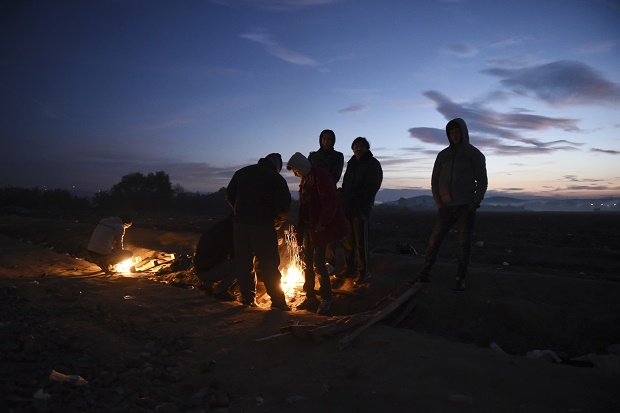
Migrants and refugees stand around a fire as they try to keep warm themselves while waiting to pass from the northern Greek village of Idomeni to southern Macedonia Monday, Oct. 26, 2015. European leaders decide that reception capacities should be boosted in Greece and along the Balkans migration route to accommodate 100,000 more people as winter looms. AP
BRUSSELS — The European Union warned on Monday of a looming humanitarian “catastrophe” with tens of thousands of people traveling through the Balkans to northern Europe as winter closes in.
More than 770,000 people have arrived in the EU by sea so far this year, overwhelming border authorities and reception facilities. Many have made the arduous land journey on foot through the Balkans in search of sanctuary or work in countries like Germany or Sweden.
The EU’s 28 member nations have pledged to provide experts and funds to help manage the emergency, and to share refugees among them.
READ: EU predicts 3 million more migrants could arrive by end 2016
But the resources have been painfully slow in coming.
“The European Union must do everything to avoid a catastrophe as winter closes in,” Luxembourg Foreign Minister Jean Asselborn said after chairing the latest in a long series of high-level talks on the challenge. “We cannot let people die from the cold in the Balkans.”
To help manage the influx, EU border agency Frontex has called for 775 extra officers, but member states have so far only offered about half that amount. Slovenia asked for 400 more police officers within a week to help out. Almost three weeks later, less than half has been pledged.
A so-called relocation plan is meant to share 160,000 refugees arriving in Greece and Italy, but barely more than 100 people have been moved so far.
“We need to move from the dozens to the hundreds,” the EU’s top migration official, Dmitris Avramopoulos, told reporters after the meeting in Brussels.
READ: UN refugee chief: funding shortage triggered Europe arrivals
Asselborn said the ministers had discussed setting up “processing centers” in the Balkans, where people could be registered and given information as they travel further north. But they would also have to accept to have their fingerprints taken, which some migrants are refusing to do.
French Interior Minister Bernard Cazeneuve said that his country had committed to relocate 30,000 refugees “in coming weeks and months.”
He also urged his EU partners to live up to their pledges and to enforce the rules in place on returning people who don’t qualify for asylum back to their home countries.
“Solidarity can’t work if we are not determined enough to implement the measures that we have already agreed,” he said.